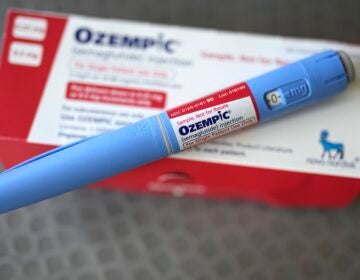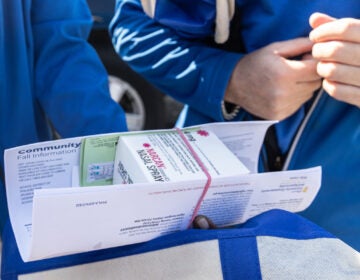Coronavirus update: Murphy corrects prosecutor, calls McConnell ‘utterly irresponsible’
The New Jersey governor on Wednesday clarified COVID-19 testing protocols and called on federal lawmakers to help states “in their most profound hour of need.”
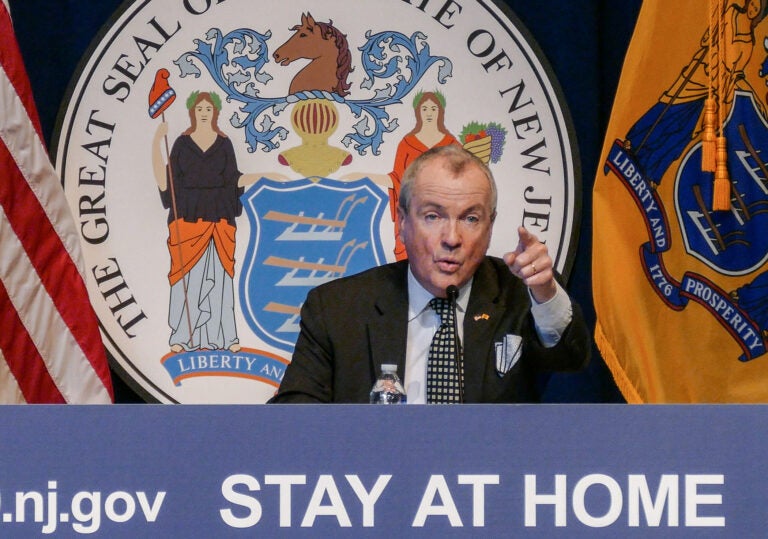
New Jersey Gov. Phil Murphy delivers a coronavirus briefing on Wednesday, April 8, 2020. (Pool photo by Michael Mancuso | NJ Advance Media for NJ.com)
Are you on the front lines of the coronavirus? Help us report on the pandemic.
New Jersey reported 3,551 new coronavirus cases Wednesday, bringing the state’s total to 95,865 residents with the sickness.
Another 314 people died of COVID-19, which means New Jersey has now seen a total of 5,063 as a result of the pandemic.
Testing criteria unchanged at Bergen, Monmouth sites
New Jersey residents must still show signs of a respiratory illness to get tested at the state’s two main drive-thru testing sites, Gov. Phil Murphy said Wednesday.
His comments came a few hours after a post on the Monmouth County Prosecutor’s Office website incorrectly indicated that asymptomatic residents could now be screened at the Bergen and Monmouth County facilities.
Murphy said the state needs a federal waiver to begin testing asymptomatic residents at those sites, because they are run in conjunction with FEMA.
The two testing centers — at Bergen Community College and the PNC Bank Arts Center in Monmouth County — have only been screening residents with symptoms of COVID-19.
But the sites saw a dip in demand in recent days, a stark difference from previous weeks when they would hit capacity in a matter of minutes.
On Tuesday, Murphy was asked whether the testing criteria at the Paramus and Holmdel sites was too strict. “We are assessing the entirety of the testing regime right now,” he said.
State buys 500 new ventilators
New Jersey purchased 500 new ventilators to treat critical COVID-19 patients and received them Wednesday, Murphy said.
He noted that this was the first time during the pandemic that the state was able to source and buy ventilators, as opposed to borrowing them from the Trump administration or other states.
“They’re in the house. We bought ‘em. They’re ours,” Murphy said.
The life-saving breathing machines are used to treat the most critically ill coronavirus patients whose lungs have been ravaged by the illness.
As of Wednesday afternoon, 1,570 patients were on ventilators across the state.
Hospitals must report racial data
A new state law will require New Jersey hospitals to report demographic data on COVID-19 patients to the Department of Health.
Murphy, who signed the law Wednesday, said the state had noticed worrying trends in how the coronavirus was impacting Black and Latinx populations, in particular, and that better data would help officials better identify and deal with those disparities.
“This emergency has had an outsize impact on our communities of color,” he said.
The new law forces hospitals to track and disclose data on the age, ethnicity, gender, and race of their COVID-19 patients. DOH has already begun posting the information collected from hospitals online.
Murphy noted that the percentage of coronavirus fatalities who were Black was 50% higher than their representation in the statewide population.
Murphy to McConnell: ‘Come on, man’
During his daily press briefing Wednesday, Murphy unleashed an uncharacteristically angry tirade against U.S. Senate Majority Leader Mitch McConnell for comments he made earlier in the day.
The Republican from Kentucky suggested that some states and cities should declare bankruptcy instead of relying on the federal government to prop up public finances that have been obliterated by the COVID-19 pandemic.
“Come on, man,” Murphy said. “That is completely and utterly irresponsible”
He went on: “Secondly, as usual, he’s dead wrong, because that won’t happen.”
Murphy suggested that, absent federal help, states would be able to stay financially afloat but be forced to make painful decisions about spending cuts.
“We will gut the living daylights in every state in America out of the services — the exact services — that our citizens need right now. We will just cut, cut, cut, and cut,” Murphy warned.
Murphy again called on federal lawmakers to provide direct cash assistance to states that have been hardest hit by the pandemic so they could help residents “in their most profound hour of need.”
South Jersey economy could take $5 billion hit
The coronavirus could inflict upwards of $5 billion in economic pain on South Jersey this year — that’s far larger than the damage done by Superstorm Sandy or the Great Recession.
That’s according to researchers at the William J. Hughes Center for Public Policy at Stockton University, who said their model depends on how long Murphy’s stay-at-home order extends into the summer and how much economic output is lost even after a return to “normalcy.”
South Jersey’s economy is especially susceptible given its outsized reliance on revenues from tourism, hospitality and real estate, all of which have been among the hardest hit industries in recent weeks. Atlantic City’s nine casinos, which employ some 26,000 people, have been closed since March 16.
“The regional economy’s reliance upon the leisure and hospitality sector again looms large,” Stockton economist Oliver Cooke wrote. “We play and vacation together. And, personal, intimate, high-quality service (whether provided at a poker or restaurant table) arguably lies at the heart of the hospitality business.”
The region’s economy had been coming off its strongest year since 1984, the year Trump Plaza opened in Atlantic City, Cooke said. Total employment there had grown by more than 3% in 2019, or about three times statewide growth.
WHYY is your source for fact-based, in-depth journalism and information. As a nonprofit organization, we rely on financial support from readers like you. Please give today.


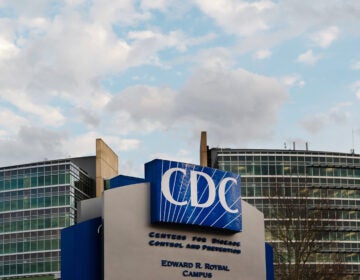
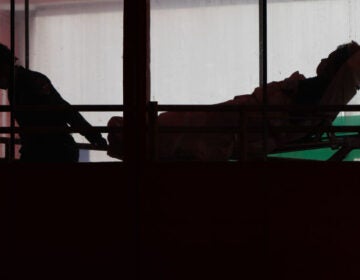
![CoronavirusPandemic_1024x512[1]](https://whyy.org/wp-content/uploads/2020/03/CoronavirusPandemic_1024x5121-300x150.jpg)
